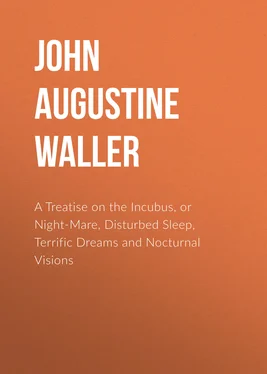John Waller - A Treatise on the Incubus, or Night-Mare, Disturbed Sleep, Terrific Dreams and Nocturnal Visions
Здесь есть возможность читать онлайн «John Waller - A Treatise on the Incubus, or Night-Mare, Disturbed Sleep, Terrific Dreams and Nocturnal Visions» — ознакомительный отрывок электронной книги совершенно бесплатно, а после прочтения отрывка купить полную версию. В некоторых случаях можно слушать аудио, скачать через торрент в формате fb2 и присутствует краткое содержание. Жанр: foreign_prose, foreign_religion, Философия, foreign_psychology, foreign_antique, на английском языке. Описание произведения, (предисловие) а так же отзывы посетителей доступны на портале библиотеки ЛибКат.
- Название:A Treatise on the Incubus, or Night-Mare, Disturbed Sleep, Terrific Dreams and Nocturnal Visions
- Автор:
- Жанр:
- Год:неизвестен
- ISBN:нет данных
- Рейтинг книги:3 / 5. Голосов: 1
-
Избранное:Добавить в избранное
- Отзывы:
-
Ваша оценка:
- 60
- 1
- 2
- 3
- 4
- 5
A Treatise on the Incubus, or Night-Mare, Disturbed Sleep, Terrific Dreams and Nocturnal Visions: краткое содержание, описание и аннотация
Предлагаем к чтению аннотацию, описание, краткое содержание или предисловие (зависит от того, что написал сам автор книги «A Treatise on the Incubus, or Night-Mare, Disturbed Sleep, Terrific Dreams and Nocturnal Visions»). Если вы не нашли необходимую информацию о книге — напишите в комментариях, мы постараемся отыскать её.
A Treatise on the Incubus, or Night-Mare, Disturbed Sleep, Terrific Dreams and Nocturnal Visions — читать онлайн ознакомительный отрывок
Ниже представлен текст книги, разбитый по страницам. Система сохранения места последней прочитанной страницы, позволяет с удобством читать онлайн бесплатно книгу «A Treatise on the Incubus, or Night-Mare, Disturbed Sleep, Terrific Dreams and Nocturnal Visions», без необходимости каждый раз заново искать на чём Вы остановились. Поставьте закладку, и сможете в любой момент перейти на страницу, на которой закончили чтение.
Интервал:
Закладка:
This affection has been very elegantly and correctly described both by physicians and poets. There are two descriptions of the latter kind which I cannot help placing before the reader; the first is given by the Prince of Latin Poets; the other by one, (not the least,) of our own country.
Ac veluti in somnis, oculos ubi languida pressit
Nocte quies, nequidquam avidos extendere cursus
Velle videmur, et in mediis conatibus ægri
Succidimus; non lingua valet, non corpore notæ
Sufficiunt vires, nec vox aut verba sequuntur.
Virgil. Æneid. Lib. xii. v. 909. et sequent.In broken dreams the image rose
Of varied perils, pains, and woes;
His steed now flounders in the brake,
Now sinks his barge upon the lake;
Now leader of a broken host,
His standard falls, his honour’s lost.
Then—from my couch may heavenly might
Chase that worst phantom of the night!
In tracing out the symptoms and mode of attack, I shall particularize those symptoms which I have experienced in my own person, and take notice likewise of those described by other writers on the subject.
First then, this disease attacks always during sleep. This is a truth of which I am now well assured, although frequently the evidence of my senses has apparently produced a contrary conviction. Whatever may be the situation of the patient at the moment previous to the invasion of the disease, he is at that moment asleep, although the transition from the waking to the sleeping state may be so rapid as to be imperceptible. I will explain this part of the subject more fully by and by, at present we will assume the fact, and proceed to enumerate the symptoms. If the patient be in a profound sleep, he is generally alarmed with some disagreeable dream; he imagines that he is exposed to some danger, or pursued by some enemy which he cannot avoid; frequently he feels as though his legs were tied, or deprived of the power of motion; sometimes he fancies himself confined in some very close place, where he is in danger of suffocation, or at the bottom of a cavern or vault from which his return is intercepted. It will not unfrequently happen, that this is the whole of the sensation which the disease, for the time, produces, when it goes off without creating any further annoyance: the patient either falls into an oblivious slumber, or the alarming dream is succeeded by one more pleasant. In this case the disease is not fully formed, but only threatens an invasion; it proves however that the pre-disposition to it exists, and that the person is in danger of it. But when the paroxysm does actually take place, the uneasiness of the patient in his dream rapidly increases, till it ends in a kind of consciousness that he is in bed, and asleep; but he feels to be oppressed with some weight which confines him upon his back and prevents his breathing, which is now become extremely laborious, so that the lungs cannot be fully inflated by any effort he can make. The sensation is now the most painful that can be conceived; the person becomes every instant more awake and conscious of his situation: he makes violent efforts to move his limbs, especially his arms, with a view of throwing off the incumbent weight, but not a muscle will obey the impulse of the will: he groans aloud, if he has strength to do it, while every effort he makes seems to exhaust the little remaining vigour. The difficulty of breathing goes on increasing, so that every breath he draws, seems to be almost the last that he is likely to draw; the heart generally moves with increased velocity, sometimes is affected with palpitation; the countenance appears ghastly, and the eyes are half open. The patient, if left to himself, lies in this state generally about a minute or two, when he recovers all at once the power of volition: upon which he either jumps up in bed, or instantly changes his position, so as to wake himself thoroughly. If this be not done, the paroxysm is very apt to recur again immediately, as the propensity to sleep is almost irresistible, and, if yielded to, another paroxysm of Night-Mare is for the most part inevitable.
Where the Disease has not established itself by very frequent recurrence, the patient generally feels little inconvenience from it when thoroughly awoke; but where it is habitual, there will generally be felt some confusion in the head, with singing in the ears, a sense of weight about the forehead, and, if in the dark, luminous spectra are frequently seen, such as appear to persons who immediately after gazing on a strong light, close their eyes. The pulse, I believe, will in all instances be found to be considerably accelerated; in my own case the motion of the heart amounts almost to a palpitation.
I do not find this symptom taken notice of by any writer on the subject, excepting Etmuller, whose accuracy in tracing the history of every disease allowed no symptom to escape him. When reasoning on the phenomena which this affection exhibits, “ et cum etiam simul sub respirationis defectu imminuta plus minus evadat sanguinis circulatio, ob id ab eodem infarcti pulmones anxietatem insignem præcordiorum inducunt: sicut dum evigilant tales ægri, cor insignitur palpitat, quod testatur motum convulsivum .”—This palpitation of the heart grows stronger in proportion to the length of the paroxysm, or the difficulty the patient finds in waking himself.
There is, however, another symptom, which, as far as I am able to learn, is very frequent, though not noticed by medical writers. ( Scilicet. ) Priapismus interdum vix tolerabilis et aliquamdiu post paroxysmi solutionem persistens. I have noticed this symptom here, as I intend presently to draw some inference from it. A sense of weight at the stomach, and an unpleasant taste in the mouth will generally be found to remain after the paroxysm, though seldom noticed, as it is not suspected to have any connexion with the Night-Mare.
These are the most ordinary symptoms, and such as generally happen in almost all paroxysms of Night-Mare; there are, however, other symptoms which occasionally occur, and which sometimes cause no small alarm to the patient. It frequently happens too, that the paroxysm goes off without the patient waking, and in that case is productive of strange hallucination to the person who is not accustomed to these paroxysms. It is by no means an uncommon thing for the person labouring under Night-Mare to see, or at least to imagine that he sees, some figure, either human, or otherwise, standing by him, threatening him, or deriding, or oppressing him. This circumstance has been productive of considerable misapprehensions and mistakes, not only with persons of weak minds, but likewise with those whose intellectual faculties have been greatly improved.—These visions are various, as are likewise the senses which become thus hallucinated; not only the sight, but the hearing, and the touch, are frequently imposed on. These hallucinations have so often occurred to myself, that they have long been rendered quite familiar, although they are still sometimes productive of very laughable mistakes. As they are more frequently, however, of the terrific cast, they act very powerfully on the minds of those who are not acquainted with them, and produce terrors which I verily believe sometimes prove fatal. I shall give some instances of these kinds of visions which I have had from the most indubitable authority, and I do not doubt but that many readers will find in their own recollections a number of circumstances apparently incredible, which will easily admit of the same solution. I must first premise, that the degree of consciousness during a paroxysm of Night-Mare is so much greater than ever happens in a dream, that the person who has had a vision of this kind cannot easily bring himself to acknowledge the deceit, unless, as often happens, he wakes out of the paroxysm, and finds himself in a very different place to what he must have been in for such a transaction to have occurred. When however, all the circumstances of time and place concur with the vision, which sometimes happens, and the patient does not wake in the paroxysm, but continues asleep for some time after, the transactions which occurred during the paroxysm of Night-Mare, and those of the dreams which took place during profound sleep are so very different as to the impression they have left on the sensorium, that there is no possibility of confounding them with one another. Indeed I know no way which a man has of convincing himself that the vision which has occurred during a paroxysm of Night-Mare, (if it be consistent in point of time and place,) is not real, unless he could have the evidence of other persons to the contrary who were present, and awake at the time, or that these hallucinations were rendered familiar to him by frequent repetition. I shall mention some circumstances here, which have occurred to myself and to others, which will place this subject in a clearer point of view.
Читать дальшеИнтервал:
Закладка:
Похожие книги на «A Treatise on the Incubus, or Night-Mare, Disturbed Sleep, Terrific Dreams and Nocturnal Visions»
Представляем Вашему вниманию похожие книги на «A Treatise on the Incubus, or Night-Mare, Disturbed Sleep, Terrific Dreams and Nocturnal Visions» списком для выбора. Мы отобрали схожую по названию и смыслу литературу в надежде предоставить читателям больше вариантов отыскать новые, интересные, ещё непрочитанные произведения.
Обсуждение, отзывы о книге «A Treatise on the Incubus, or Night-Mare, Disturbed Sleep, Terrific Dreams and Nocturnal Visions» и просто собственные мнения читателей. Оставьте ваши комментарии, напишите, что Вы думаете о произведении, его смысле или главных героях. Укажите что конкретно понравилось, а что нет, и почему Вы так считаете.












